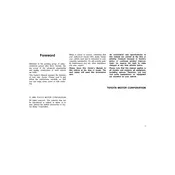Toyota Camry CNG 1999 Owner's Manual


The CNG tank in a 1999 Toyota Camry Sedan should be inspected every 36 months or 36,000 miles, whichever comes first, to ensure safety and performance.
To improve fuel efficiency, ensure regular maintenance, keep tires properly inflated, reduce excess weight, and drive at moderate speeds.
Frequent stalling may be due to issues with the CNG fuel system, ignition system, or air intake. Check for clogged fuel filters, faulty spark plugs, or vacuum leaks.
Ensure the vehicle is turned off before refueling. Attach the CNG nozzle securely, fill the tank to the recommended pressure, and avoid overfilling.
Signs include reduced performance, engine misfires, unusual noises, or the check engine light illuminating. Have the system inspected by a professional if these occur.
Yes, if your Camry is a bi-fuel model, you can switch between CNG and gasoline. Refer to your owner’s manual for the proper procedure to switch fuels.
Use a high-quality synthetic oil with a viscosity rating of 5W-30 for optimal engine performance and protection in a 1999 Toyota Camry CNG.
It is recommended to replace the air filter every 12,000 to 15,000 miles to maintain efficient engine performance and fuel economy.
The recommended tire pressure for a 1999 Toyota Camry Sedan is typically 30-32 psi for both front and rear tires. Check the door jamb for specific recommendations.
Use an OBD-II scanner to retrieve the trouble codes and identify the issue. Common causes include faulty sensors, a loose gas cap, or emissions system problems.